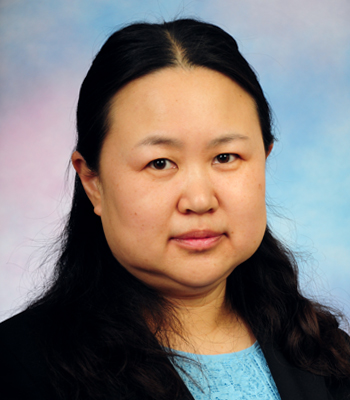Mary Zhang
Office location
Karmanos Cancer InstituteHudson-Webber Cancer Research Center RM 716
4100 John R Rd. HW07AO
Detroit, MI 48201
Office phone
313-576-8672Office fax
313-576-8928Education training
Education
(1993-1998) Ph.D. Molecular Biology, University of Texas M.D. Anderson Cancer Center, Houston, TX
(1991-1993) M.S. Biochemistry, University of Texas M.D. Anderson Cancer Center, Houston, TX
(1985-1989) B.S. Biology, Beijing Normal University, Beijing, China
Postgraduate Training
(1998-2006) Post-Doctoral Fellow, H. Lee Moffitt Cancer Center, University of South Florida College of Medicine, Tampa, FL
Professional experience
Faculty Appointments
(2015-Present) Associate Professor (Research), Department of Oncology, Barbara Ann Karmanos Cancer Institute, Wayne State University School of Medicine, Detroit, MI
(2012-2015) Associate Professor (tenured), Department of Pathology & Cell Biology, H. Lee Moffitt Cancer Institute, University of South Florida College of Medicine, Tampa, FL
(2006-2012) Assistant Professor (tenure track), Department of Pathology & Cell Biology, H. Lee Moffitt Cancer Institute, University of South Florida College of Medicine, Tampa, FL
Hopsital and Other Professional Appointments
(2015-Present) Member, Karmanos Cancer Institute
(2006-2015) Member, H. Lee Moffitt Cancer Institute
Honors and awards
(2014) Faculty Outstanding Research Achievement Award, University of South Florida
(2011-2014) Liz Tilberis Scholar
(2009-2011) K30 Program Scholar
(2008-2010) Dean's Academic Performance Award, Morsani College of Medicine
(2007) Marsha Rivkin Scholar
Courses taught
CB 7300 F31- Special Topics in Cancer Biology - Grant Writing
CB 7460: Mechanisms of Neoplasia - Alteration to Cellular Signaling
CB 7600: Applied Cancer Biostatistics
CB 7700: Recent Developments in Cancer Biology
Research interests
Dr. Zhang’s lab has a long-standing interest in the role of histone deacetylases (HDACs) in lung cancer and chemoresistance. Her lab was among the first to reveal that HDAC6 is associated with cisplatin sensitivity in lung and ovarian cancer cell lines. Her team has also identified the extracellular signal-regulated kinase 1/2 (ERK1/2) as a modulator for HDAC6’s enzymatic activity. Most significantly, her group discovered a novel ubiquitin E3 ligase activity within HDAC6 and linked HDAC6 to DNA mismatch repair and DNA damage response. Currently, there are three ongoing projects in her lab: 1) To explore the mechanisms by which HDAC6 regulates lung cancer sensitivity to tyrosine kinase inhibitors (TKIs); 2) To elucidate how ubiquitin-specific peptidase 10 (USP10) governs cisplatin sensitivity via HDAC6; 3) To explore how HDAC6 regulates ERK1 function via deacetylation.
Publications
- Niu X, Zhao J, Ma J, Xie C, Edwards H, Wang G, Caldwell JT, Xiang S, Zhang X, Chu R, Wang Z, Lin H, Taub JW, and Ge Y (2016) Binding of released Bim to Mcl-1 is a mechanism of intrinsic resistance to ABT-199 which can be overcome by combination with daunorubicin or cytarabine in AML cells. Clin Cancer Res (accepted)
- Zhang M, Hu C, Tong D, Xiang S, Williams K, Bai W, Li G-M, Bepler G, Zhang, X. Ubiquitin-Specific Peptidase 10 (USP10) Deubiquitinates and Stabilizes MutS Homolog 2 (MSH2) to Regulate Cellular Sensitivity to DNA Damage. J. Biol. Chem (in press)
- Radhakrishnan R, Li Y, Xiang S, Yuan F, Yuan Z, Telles E, Fang J, Coppola D, Shibata D, Lane WS., Zhang Y, Zhang X (co-corresponding author), and Seto E. (2015) Histone Deacetylase 10 Regulates DNA Mismatch Repair and May Involve the Deacetylation of MutS Homolog 2. J. Biol. Chem [Epub ahead of print]; PMID:26221039
- Sun Y, Sun J, Lungchukiet P, Quarni W, Yang S, Zhang X, Bai W. (2015) Fe65 Suppresses Breast Cancer Cell Migration and Invasion through Tip60 Mediated Cortactin Acetylation. Sci Rep. 13;5:11529. doi: 10.1038/srep11529; PMID: 26166158
- Kasiappan R, Sun Y, Lungchukiet P, Quarni W, Zhang X, Bai W. (2014) Vitamin D suppresses leptin stimulation of cancer growth through MicroRNA. Cancer Res. 74(21):6194-204; PMID: 25252917
- Zhang M, Xiang S, Joo H-Y, Wang, L, Williams, K, Liu W, Hu C, Tong D, Haakenson J, Wang C, Zhang S, Pavlovicz RE, Jones A, Schmidt KH, Tang J, Dong H, Shan B, Fang B, Radhakrishnan R, Glazer PM, Matthias P, Koomen J, Seto E, Bepler G, Nicosia SV, Chen J., Li C, Gu L, Li G-M, Bai W, Wang H, Zhang X. (2014) HDAC6 deacetylates and ubiquitinates MSH2 to maintain proper levels of MutS. Mol. Cell 55(1):31-46; PMID:24882211
- Sun Y, Kasiappan R, Tan J, Webb PL, Quarni W, Zhang X, Bai W. (2014) A novel function of the Fe65 neuronal adaptor in estrogen receptor action in breast cancer cells J. Biol. Chem 289(18):12217-31; PMID:24619425
- Williams KA, Zhang M, Xiang S, Hu C, Wu JY, Zhang S, Ryan M, Cox AD, Der CJ, Fang B, Koomen J, Haura E, Bepler G, Nicosia SV, Matthias P, Wang C, Bai W, Zhang X (2013) Extracellular Signal-Regulated Kinase (ERK) phosphorylates histone deacetylase 6 (HDAC6) at Serine 1035 to stimulate cell migration. J. Biol. Chem 15;288(46):33156-70; PMID:24089523
- Wang L, Xiang S, Williams KA, Dong H, Bai W, Nicosia, SV, Khochbin S, Bepler G, Zhang X. (2012) Depletion of HDAC6 enhances cisplatin-induced DNA damage and apoptosis in non-small cell lung cancer cells PLoS ONE 7(9):e44265. Epub 2012 Sep 5
- Kasiappan R, Sheng Z, Tse AKA, Jinwal U, Tang J, Lungchukiet P, Sun Y, Kruk P, Nicosia SV, Zhang X, Bai W (2012) 1,25-Dihydroxyvitamin D3 suppresses telomerase expression and human cancer growth through microRNA-498. J. Biol. Chem 287(49):41297-309
